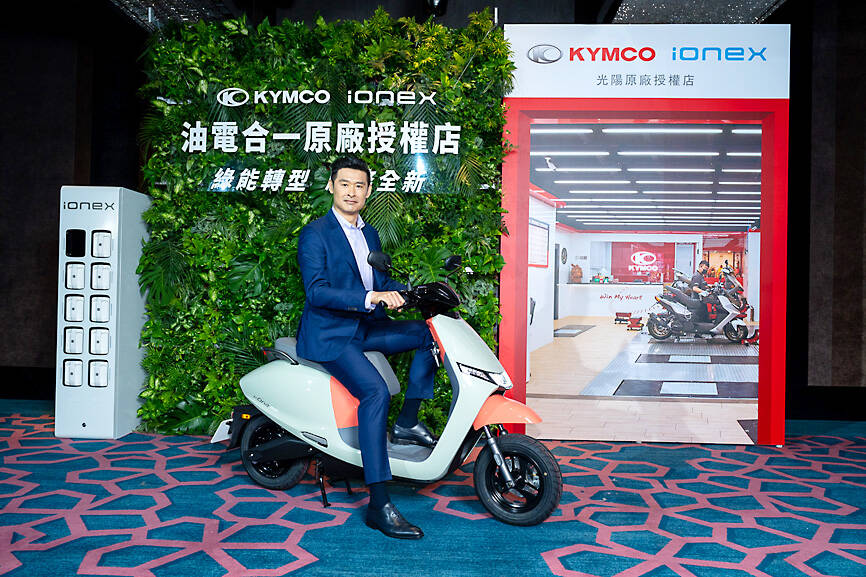Kwang Yang Motor Co (光陽工業), which sells electric scooters under the brand Ionex, is to form a joint venture with PTT Public Co to take its electric scooters and battery-swapping services to Thailand later this year, marking more progress in its strategy to expand its electric-vehicle business overseas.
The Kaohsiung-based manufacturer of scooters has been exploring electric-vehicle business opportunities outside Taiwan after forming a partnership in 2020 with Grab Holdings Inc’s two-wheel sharing-service provider, GrabWheels, by supplying electric two-wheelers.
The company has also been trying to make inroads into India for years, but has yet to report any significant progress.

Photo courtesy of Kwang Yang Motor Co
It is not the first time PTT Public has teamed team up with a Taiwanese company to tap into the electric mobility sector.
Thailand’s biggest petroleum company, PTT Public has a joint venture with Hon Hai Precision Industry Co (鴻海精密) to build electric vehicles in Thailand starting next year.
AIONEX CO
PTT’s board of directors on Wednesday approved the proposal from its fully owned subsidiary Arun Plummeted Co to enter a joint venture agreement and create a joint venture — Aionex Co — with Kwang Yang and its subsidiary KYMCO Capital Private Equity Management Co (金庫資本), a document that the Taipei Times obtained showed.
Arun is to hold a 51 percent stake in the joint venture, while Kwang Yang and KYMCO Capital would own 29 percent and 20 percent respectively.
AMBITION
Aionex would have registered capital of not more than 600 million baht (US$16.95 million) and is to start operating by the end of this year.
It is aiming to become the leader in electric two-wheelers in Thailand and ASEAN.
Aionex’s business scope is to include sales and manufacturing of electric scooters, as well as providing battery-swapping services, it said.
The joint venture is subject to approval by regulatory authorities.

Semiconductor business between Taiwan and the US is a “win-win” model for both sides given the high level of complementarity, the government said yesterday responding to tariff threats from US President Donald Trump. Home to the world’s largest contract chipmaker, Taiwan Semiconductor Manufacturing Co (TSMC, 台積電), Taiwan is a key link in the global technology supply chain for companies such as Apple Inc and Nvidia Corp. Trump said on Monday he plans to impose tariffs on imported chips, pharmaceuticals and steel in an effort to get the producers to make them in the US. “Taiwan and the US semiconductor and other technology industries

A start-up in Mexico is trying to help get a handle on one coastal city’s plastic waste problem by converting it into gasoline, diesel and other fuels. With less than 10 percent of the world’s plastics being recycled, Petgas’ idea is that rather than letting discarded plastic become waste, it can become productive again as fuel. Petgas developed a machine in the port city of Boca del Rio that uses pyrolysis, a thermodynamic process that heats plastics in the absence of oxygen, breaking it down to produce gasoline, diesel, kerosene, paraffin and coke. Petgas chief technology officer Carlos Parraguirre Diaz said that in

SMALL AND EFFICIENT: The Chinese AI app’s initial success has spurred worries in the US that its tech giants’ massive AI spending needs re-evaluation, a market strategist said Chinese artificial intelligence (AI) start-up DeepSeek’s (深度求索) eponymous AI assistant rocketed to the top of Apple Inc’s iPhone download charts, stirring doubts in Silicon Valley about the strength of the US’ technological dominance. The app’s underlying AI model is widely seen as competitive with OpenAI and Meta Platforms Inc’s latest. Its claim that it cost much less to train and develop triggered share moves across Asia’s supply chain. Chinese tech firms linked to DeepSeek, such as Iflytek Co (科大訊飛), surged yesterday, while chipmaking tool makers like Advantest Corp slumped on the potential threat to demand for Nvidia Corp’s AI accelerators. US stock

SUBSIDIES: The nominee for commerce secretary indicated the Trump administration wants to put its stamp on the plan, but not unravel it entirely US President Donald Trump’s pick to lead the agency in charge of a US$52 billion semiconductor subsidy program declined to give it unqualified support, raising questions about the disbursement of funds to companies like Intel Corp and Taiwan Semiconductor Manufacturing Co (台積電). “I can’t say that I can honor something I haven’t read,” Howard Lutnick, Trump’s nominee for commerce secretary, said of the binding CHIPS and Science Act awards in a confirmation hearing on Wednesday. “To the extent monies have been disbursed, I would commit to rigorously enforcing documents that have been signed by those companies to make sure we get